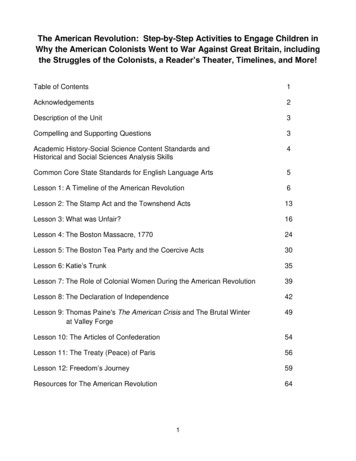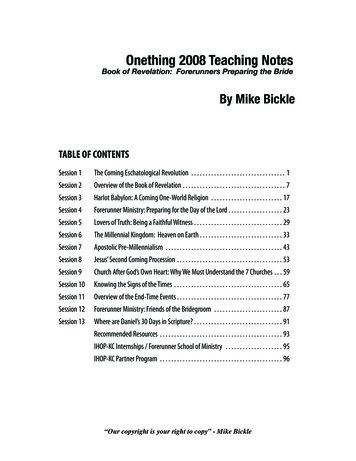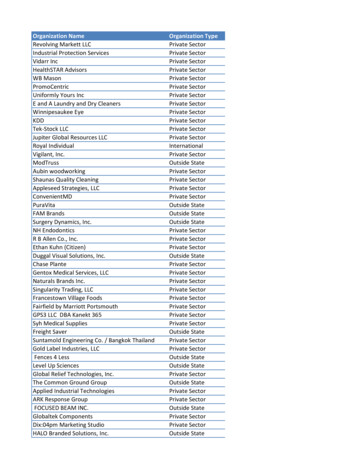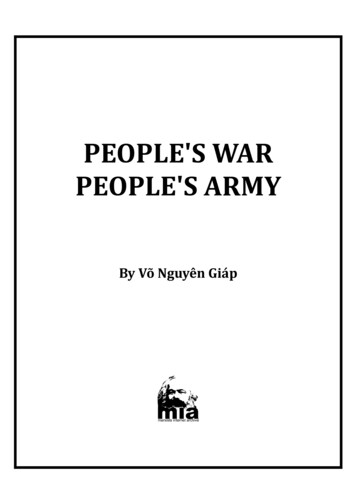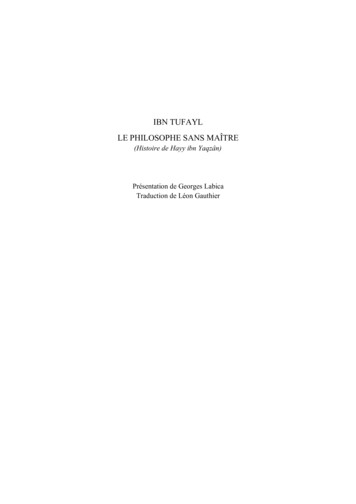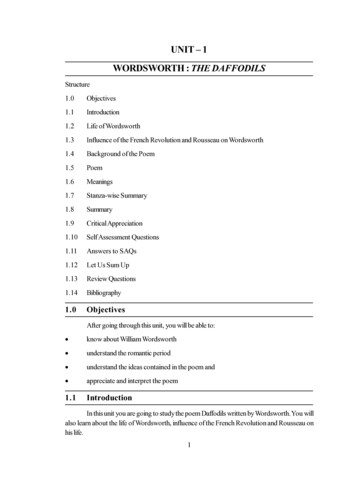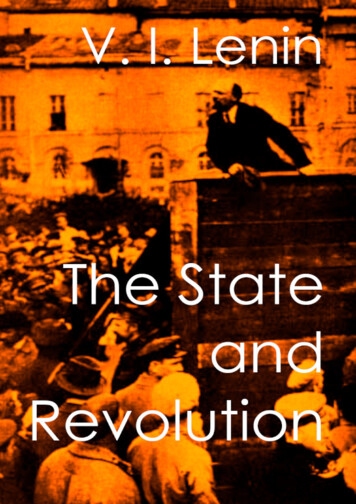
Transcription
The State and RevolutionThe Marxist Theory of the State & the Tasks of theProletariat in the RevolutionV.I. Lenin1
Written: August - September, 1917Source: Collected Works, Volume 25, p. 381-492First Published: 1918Transcription\Markup: Zodiac and Brian BagginsOnline Version: Lenin Internet Archive (marxists.org) 1993, 1999Converted to eBook format by: anonymous2
Note from the Lenin Internet ArchiveLenin wrote The State and Revolution in August and September 1917, when he was inhiding from persecution of the Provisional Government. The need for such atheoretical work as this was mentioned by Lenin in the second half of 1916. It wasthen that he wrote his note on "The Youth International", in which he criticisedBukharin's position on the question of the state and promised to write a detailedarticle on what he thought to be the Marxist attitude to the state. In a letter to A. M.Kollontai on February 17 (N.S.), 1917, he said that he had almost got ready materialon that question . This material was written in a small blue-covered notebook headed"Marxism on the State". In it Lenin had collected quotations from the works of Marxand Engels, and extracts from the books by Kautsky, Pannekoek and Bernstein withhis own critical notes, conclusions and generalisations.When Lenin left Switzerland for Russia in April 1917, he feared arrest by theProvisional Government and left the manuscript of "Marxism on the State" behind —as it would have been destroyed had he been caught. When in hiding after the Julyevents, Lenin wrote in a note:"Entre nous, if I am knocked off, I ask you to publish my notebook 'Marxism onthe State' (it got held up in Stockholm). It is bound in a blue cover. All thequotations from Marx and Engels are collected there, also those from Kautskyagainst Pannekoek. There are a number of remarks, notes and formulas. I think aweek's work would be enough to publish it. I consider it important because notonly Plekhanov, but Kautsky, too, is confused." When Lenin received hisnotebook from Stockholm, he used the material he had collected as a basis forhis book The State and Revolution.According to Lenin's plan, The State and Revolution was to have consisted of sevenchapters, but he did not write the seventh, "The Experience of the RussianRevolutions of 1905 and 1917", and only a detailed plan has remained. In a note tothe publisher Lenin wrote that if he "was too slow in competing this, the seventhchapter, or should it turn out to be too bulky, the first six chapters should be publishedseparately as Book One."Originally, the name F.F. Ivanovsky is shown on the first page of the notebookmanuscript as that of the author. Lenin intended to publish the book under thatpseudonym, otherwise the Provisional Government would have confiscated it for hisname alone. The book, however, was not printed until 1918, when there was no longerany need for the pseudonym. The second edition appeared in 1919; in this revisionLenin added to Chapter II a new section "The Presentation of the Question by Marx in1852".3
Preface to the First EditionThe question of the state is now acquiring particular importance both in theory and inpractical politics. The imperialist war has immensely accelerated and intensified theprocess of transformation of monopoly capitalism into state-monopoly capitalism.The monstrous oppression of the working people by the state, which is merging moreand more with the all-powerful capitalist associations, is becoming increasinglymonstrous. The advanced countries - we mean their hinterland - are becomingmilitary convict prisons for the workers.The unprecedented horrors and miseries of the protracted war are making the people'sposition unbearable and increasing their anger. The world proletarian revolution isclearly maturing. The question of its relation to the state is acquiring practicalimportance.The elements of opportunism that accumulated over the decades of comparativelypeaceful development have given rise to the trend of social-chauvinism whichdominated the official socialist parties throughout the world. This trend - socialism inwords and chauvinism in deeds (Plekhanov, Potresov, Breshkovskaya, Rubanovich,and, in a slightly veiled form, Tsereteli, Chernov and Co. in Russia; Scheidemann.Legien, David and others in Germany; Renaudel, Guesde and Vandervelde in Franceand Belgium; Hyndman and the Fabians1 in England, etc., etc.) - is conspicuous forthe base, servile adaptation of the "leaders of socialism" to the interests not only of"their" national bourgeoisie, but of "their" state, for the majority of the so-called GreatPowers have long been exploiting and enslaving a whole number of small and weaknations. And the imperialist war is a war for the division and redivision of this kind ofbooty. The struggle to free the working people from the influence of the bourgeoisiein general, and of the imperialist bourgeoisie in particular, is impossible without astruggle against opportunist prejudices concerning the "state".First of all we examine the theory of Marx and Engels of the state, and dwell inparticular detail on those aspects of this theory which are ignored or have beendistorted by the opportunists. Then we deal specially with the one who is chieflyresponsible for these distortions, Karl Kautsky, the best-known leader of the SecondInternational (1889-1914), which has met with such miserable bankruptcy in thepresent war. Lastly, we sum up the main results of the experience of the Russianrevolutions of 1905 and particularly of 1917. Apparently, the latter is now (earlyAugust 1917) completing the first stage of its development; but this revolution as awhole can only be understood as a link in a chain of socialist proletarian revolutionsbeing caused by the imperialist war. The question of the relation of the socialistproletarian revolution to the state, therefore, is acquiring not only practical politicalimportance, but also the significance of a most urgent problem of the day, the problemof explaining to the masses what they will have to do before long to free themselvesfrom capitalist tyranny.4
The AuthorAugust 19175
Preface to the Second EditionThe present, second edition is published virtually unaltered, except that section 3 hadbeen added to Chapter II.The AuthorMoscow, December 17, 19186
Chapter I: Class Society and the State1. The State: A Product of the Irreconcilability ofClass AntagonismsWhat is now happening to Marx's theory has, in the course of history, happenedrepeatedly to the theories of revolutionary thinkers and leaders of oppressed classesfighting for emancipation. During the lifetime of great revolutionaries, the oppressingclasses constantly hounded them, received their theories with the most savage malice,the most furious hatred and the most unscrupulous campaigns of lies and slander.After their death, attempts are made to convert them into harmless icons, to canonizethem, so to say, and to hallow their names to a certain extent for the “consolation” ofthe oppressed classes and with the object of duping the latter, while at the same timerobbing the revolutionary theory of its substance, blunting its revolutionary edge andvulgarizing it. Today, the bourgeoisie and the opportunists within the labor movementconcur in this doctoring of Marxism. They omit, obscure, or distort the revolutionaryside of this theory, its revolutionary soul. They push to the foreground and extol whatis or seems acceptable to the bourgeoisie. All the social-chauvinists are now“Marxists” (don't laugh!). And more and more frequently German bourgeois scholars,only yesterday specialists in the annihilation of Marxism, are speaking of the“national-German” Marx, who, they claim, educated the labor unions which are sosplendidly organized for the purpose of waging a predatory war!In these circumstances, in view of the unprecedently wide-spread distortion ofMarxism, our prime task is to re-establish what Marx really taught on the subject ofthe state. This will necessitate a number of long quotations from the works of Marxand Engels themselves. Of course, long quotations will render the text cumbersomeand not help at all to make it popular reading, but we cannot possibly dispense withthem. All, or at any rate all the most essential passages in the works of Marx andEngels on the subject of the state must by all means be quoted as fully as possible sothat the reader may form an independent opinion of the totality of the views of thefounders of scientific socialism, and of the evolution of those views, and so that theirdistortion by the “Kautskyism” now prevailing may be documentarily proved andclearly demonstrated.Let us being with the most popular of Engels' works, The Origin of the Family,Private Property and the State, the sixth edition of which was published in Stuttgart asfar back as 1894. We have to translate the quotations from the German originals, asthe Russian translations, while very numerous, are for the most part either incompleteor very unsatisfactory.Summing up his historical analysis, Engels says:7
“The state is, therefore, by no means a power forced on society from without;just as little is it 'the reality of the ethical idea', 'the image and reality of reason',as Hegel maintains. Rather, it is a product of society at a certain stage ofdevelopment; it is the admission that this society has become entangled in aninsoluble contradiction with itself, that it has split into irreconcilableantagonisms which it is powerless to dispel. But in order that these antagonisms,these classes with conflicting economic interests, might not consume themselvesand society in fruitless struggle, it became necessary to have a power, seeminglystanding above society, that would alleviate the conflict and keep it within thebounds of 'order'; and this power, arisen out of society but placing itself above it,and alienating itself more and more from it, is the state." (Pp.177-78, sixthedition)2This expresses with perfect clarity the basic idea of Marxism with regard to thehistorical role and the meaning of the state. The state is a product and a manifestationof the irreconcilability of class antagonisms. The state arises where, when and insofaras class antagonism objectively cannot be reconciled. And, conversely, the existenceof the state proves that the class antagonisms are irreconcilable.It is on this most important and fundamental point that the distortion of Marxism,proceeding along two main lines, begins.On the one hand, the bourgeois, and particularly the petty-bourgeois, ideologists,compelled under the weight of indisputable historical facts to admit that the state onlyexists where there are class antagonisms and a class struggle, “correct” Marx in such away as to make it appear that the state is an organ for the reconciliation of classes.According to Marx, the state could neither have arisen nor maintained itself had itbeen possible to reconcile classes. From what the petty-bourgeois and philistineprofessors and publicists say, with quite frequent and benevolent references to Marx,it appears that the state does reconcile classes. According to Marx, the state is anorgan of class rule, an organ for the oppression of one class by another; it is thecreation of “order”, which legalizes and perpetuates this oppression by moderating theconflict between classes. In the opinion of the petty-bourgeois politicians, however,order means the reconciliation of classes, and not the oppression of one class byanother; to alleviate the conflict means reconciling classes and not depriving theoppressed classes of definite means and methods of struggle to overthrow theoppressors.For instance, when, in the revolution of 1917, the question of the significance and roleof the state arose in all its magnitude as a practical question demanding immediateaction, and, moreover, action on a mass scale, all the Social-Revolutionaries andMensheviks descended at once to the petty-bourgeois theory that the “state”“reconciles” classes. Innumerable resolutions and articles by politicians of both theseparties are thoroughly saturated with this petty-bourgeois and philistine“reconciliation” theory. That the state is an organ of the rule of a definite class whichcannot be reconciled with its antipode (the class opposite to it) is something the pettybourgeois democrats will never be able to understand. Their attitude to the state is one8
of the most striking manifestations of the fact that our Socialist- Revolutionaries andMensheviks are not socialists at all (a point that we Bolsheviks have alwaysmaintained), but petty-bourgeois democrats using near-socialist phraseology.On the other hand, the “Kautskyite” distortion of Marxism is far more subtle.“Theoretically”, it is not denied that the state is an organ of class rule, or that classantagonisms are irreconcilable. But what is overlooked or glossed over is this: if thestate is the product of the irreconcilability of class antagonisms, if it is a powerstanding above society and “alienating itself more and more from it", it is clear thatthe liberation of the oppressed class is impossible not only without a violentrevolution, but also without the destruction of the apparatus of state power which wascreated by the ruling class and which is the embodiment of this “alienation”. As weshall see later, Marx very explicitly drew this theoretically self-evident conclusion onthe strength of a concrete historical analysis of the tasks of the revolution. And — aswe shall show in detail further on — it is this conclusion which Kautsky has“forgotten” and distorted.2. Special Bodies of Armed Men, Prisons, etc.Engels continues:“As distinct from the old gentile [tribal or clan] order,[2] the state, first, dividesits subjects according to territory."This division seems “natural” to us, but it costs a prolonged struggle against the oldorganization according to generations or tribes.“The second distinguishing feature is the establishment of a public power whichno longer directly coincides with the population organizing itself as an armedforce. This special, public power is necessary because a self-acting armedorganization of the population has become impossible since the split intoclasses. This public power exists in every state; it consists not merely of armedmen but also of material adjuncts, prisons, and institutions of coercion of allkinds, of which gentile [clan] society knew nothing."Engels elucidates the concept of the “power” which is called the state, a power whicharose from society but places itself above it and alienates itself more and more fromit. What does this power mainly consist of? It consists of special bodies of armed menhaving prisons, etc., at their command.We are justified in speaking of special bodies of armed men, because the public powerwhich is an attribute of every state “does not directly coincide” with the armedpopulation, with its “self-acting armed organization".Like all great revolutionary thinkers, Engels tries to draw the attention of the classconscious workers to what prevailing philistinism regards as least worthy of attention,as the most habitual thing, hallowed by prejudices that are not only deep-rooted but,9
one might say, petrified. A standing army and police are the chief instruments of statepower. But how can it be otherwise?From the viewpoint of the vast majority of Europeans of the end of the 19th century,whom Engels was addressing, and who had not gone through or closely observed asingle great revolution, it could not have been otherwise. They could not understandat all what a “self-acting armed organization of the population” was. When asked whyit became necessary to have special bodies of armed men placed above society andalienating themselves from it (police and a standing army), the West-European andRussian philistines are inclined to utter a few phrases borrowed from Spencer ofMikhailovsky, to refer to the growing complexity of social life, the differentiation offunctions, and so on.Such a reference seems “scientific”, and effectively lulls the ordinary person to sleepby obscuring the important and basic fact, namely, the split of society intoirreconcilable antagonistic classes.Were it not for this split, the “self-acting armed organization of the population” woulddiffer from the primitive organization of a stick-wielding herd of monkeys, or ofprimitive men, or of men united in clans, by its complexity, its high technical level,and so on. But such an organization would still be possible.It is impossible because civilized society is split into antagonistic, and, moreover,irreconcilably antagonistic classes, whose “self-acting” arming would lead to anarmed struggle between them. A state arises, a special power is created, special bodiesof armed men, and every revolution, by destroying the state apparatus, shows us thenaked class struggle, clearly shows us how the ruling class strives to restore thespecial bodies of armed men which serve it, and how the oppressed class strives tocreate a new organization of this kind, capable of serving the exploited instead of theexploiters.In the above argument, Engels raises theoretically the very same question which everygreat revolution raises before us in practice, palpably and, what is more, on a scale ofmass action, namely, the question of the relationship between “special” bodies ofarmed men and the “self-acting armed organization of the population". We shall seehow this question is specifically illustrated by the experience of the European andRussian revolutions.But to return to Engel's exposition.He points out that sometimes — in certain parts of North America, for example —this public power is weak (he has in mind a rare exception in capitalist society, andthose parts of North America in its pre-imperialist days where the free colonistspredominated), but that, generally speaking, it grows stronger:“It [the public power] grows stronger, however, in proportion as classantagonisms within the state become more acute, and as adjacent states become10
larger and more populous. We have only to look at our present-day Europe,where class struggle and rivalry in conquest have tuned up the public power tosuch a pitch that it threatens to swallow the whole of society and even the state."This was written not later than the early nineties of the last century, Engel's lastpreface being dated June 16, 1891. The turn towards imperialism — meaning thecomplete domination of the trusts, the omnipotence of the big banks, a grand-scalecolonial policy, and so forth — was only just beginning in France, and was evenweaker in North America and in Germany. Since then “rivalry in conquest” has takena gigantic stride, all the more because by the beginning of the second decade of the20th century the world had been completely divided up among these “rivals inconquest", i.e., among the predatory Great Powers. Since then, military and navalarmaments have grown fantastically and the predatory war of 1914-17 for thedomination of the world by Britain or Germany, for the division of the spoils, hasbrought the “swallowing” of all the forces of society by the rapacious state powerclose to complete catastrophe.Engels' could, as early as 1891, point to “rivalry in conquest" as one of the mostimportant distinguishing features of the foreign policy of the Great Powers, while thesocial-chauvinist scoundrels have ever since 1914, when this rivalry, many timeintensified, gave rise to an imperialist war, been covering up the defence of thepredatory interests of “their own" bourgeoisie with phrases about “defence of thefatherland", “defence of the republic and the revolution", etc.!3. The State: an Instrument for the Exploitation ofthe Oppressed ClassThe maintenance of the special public power standing above society requires taxesand state loans.“Having pubic power and the right to levy taxes,” Engels writes, “the officialsnow stand, as organs of society, above society. The free, voluntary respect thatwas accorded to the organs of the gentile [clan] constitution does not satisfythem, even if they could gain it.” Special laws are enacted proclaiming thesanctity and immunity of the officials. “The shabbiest police servant” has more“authority” than the representative of the clan, but even the head of the militarypower of a civilized state may well envy the elder of a clan the “unrestrainedrespect” of society.The question of the privileged position of the officials as organs of state power israised here. The main point indicated is: what is it that places them above society? Weshall see how this theoretical question was answered in practice by the ParisCommune in 1871 and how it was obscured from a reactionary standpoint by kautskyin 1912.11
“Because the state arose from the need to hold class antagonisms in check, butbecause it arose, at the same time, in the midst of the conflict of these classes, itis, as a rule, the state of the most powerful, economically dominant class, which,through the medium of the state, becomes also the politically dominant class, andthus acquires new means of holding down and exploiting the oppressed class.”The ancient and feudal states were organs for the exploitation of the slaves andserfs; likewise, “the modern representative state is an instrument of exploitationof wage-labor by capital. By way of exception, however, periods occur in whichthe warring classes balance each other so nearly that the state power as ostensiblemediator acquires, for the moment, a certain degree of independence of both.”Such were the absolute monarchies of the 17th and 18th centuries, theBonapartism of the First and Second Empires in France, and the Bismarckregime in Germany.Such, we may add, is the Kerensky government in republican Russia since it began topersecute the revolutionary proletariat, at a moment when, owing to the leadership ofthe petty-bourgeois democrats, the Soviets have already become impotent, while thebourgeoisie are not yet strong enough simply to disperse them.In a democratic republic, Engels continues, “wealth exercises its power indirectly, butall the more surely", first, by means of the “direct corruption of officials” (America);secondly, by means of an “alliance of the government and the Stock Exchange"(France and America).At present, imperialism and the domination of the banks have “developed” into anexceptional art both these methods of upholding and giving effect to the omnipotenceof wealth in democratic republics of all descriptions. Since, for instance, in the veryfirst months of the Russian democratic republic, one might say during the honeymoonof the “socialist” S.R.s and Mensheviks joined in wedlock to the bourgeoisie, in thecoalition government. Mr. Palchinsky obstructed every measure intended for curbingthe capitalists and their marauding practices, their plundering of the state by means ofwar contracts; and since later on Mr. Palchinsky, upon resigning from the Cabinet(and being, of course, replaced by another quite similar Palchinsky), was “rewarded”by the capitalists with a lucrative job with a salary of 120,000 rubles per annum —what would you call that? Direct or indirect bribery? An alliance of the governmentand the syndicates, or “merely” friendly relations? What role do the Chernovs,Tseretelis, Avksentyevs and Skobelevs play? Are they the “direct” or only the indirectallies of the millionaire treasury-looters?Another reason why the omnipotence of “wealth” is more certain in a democraticrepublic is that it does not depend on defects in the political machinery or on thefaulty political shell of capitalism. A democratic republic is the best possible politicalshell for capitalism, and, therefore, once capital has gained possession of this verybest shell (through the Palchinskys, Chernovs, Tseretelis and Co.), it establishes itspower so securely, so firmly, that no change of persons, institutions or parties in thebourgeois-democratic republic can shake it.12
We must also note that Engels is most explicit in calling universal suffrage as well aninstrument of bourgeois rule. Universal suffrage, he says, obviously taking account ofthe long experience of German Social-Democracy, is“the gauge of the maturity of the working class. It cannot and never will beanything more in the present-day state."The petty-bourgeois democrats, such as our Socialist-Revolutionaries andMensheviks, and also their twin brothers, all the social-chauvinists and opportunistsof Western Europe, expect just this “more” from universal suffrage. They themselvesshare, and instil into the minds of the people, the false notion that universal suffrage“in the present-day state" is really capable of revealing the will of the majority of theworking people and of securing its realization.Here, we can only indicate this false notion, only point out that Engels' perfectly clearstatement is distorted at every step in the propaganda and agitation of the “official”(i.e., opportunist) socialist parties. A detailed exposure of the utter falsity of thisnotion which engels brushes aside here is given in our further account of the views ofMarx and Engels on the “present-day” state.Engels gives a general summary of his views in the most popular of his works in thefollowing words:“The state, then, has not existed from all eternity. There have been societies thatdid without it, that had no idea of the state and state power. At a certain stage ofeconomic development, which was necessarily bound up with the split of societyinto classes, the state became a necessity owing to this split. We are now rapidlyapproaching a stage in the development of production at which the existence ofthese classes not only will have ceased to be a necessity, but will become apositive hindrance to production. They will fall as they arose at an earlier stage.Along with them the state will inevitably fall. Society, which will reorganizeproduction on the basis of a free and equal association of the producers, will putthe whole machinery of state where it will then belong: into a museum ofantiquities, by the side of the spinning-wheel and the bronze axe."We do not often come across this passage in the propaganda and agitation literature ofthe present-day Social-Democrats. Even when we do come across it, it is mostlyquoted in the same manner as one bows before an icon, i.e., it is done to show officialrespect for Engels, and no attempt is made to gauge the breadth and depth of therevolution that this relegating of “the whole machinery of state to a museum ofantiquities” implies. In most cases we do not even find an understanding of whatEngels calls the state machine.4. The “Withering Away” of the State, and ViolentRevolution13
Engel's words regarding the “withering away” of the state are so widely known, theyare often quoted, and so clearly reveal the essence of the customary adaptation ofMarxism to opportunism that we must deal with them in detail. We shall quote thewhole argument from which they are taken.“The proletariat seizes from state power and turns the means of production intostate property to begin with. But thereby it abolishes itself as the proletariat,abolishes all class distinctions and class antagonisms, and abolishes also the stateas state. Society thus far, operating amid class antagonisms, needed the state, thatis, an organization of the particular exploiting class, for the maintenance of itsexternal conditions of production, and, therefore, especially, for the purpose offorcibly keeping the exploited class in the conditions of oppression determinedby the given mode of production (slavery, serfdom or bondage, wage-labor). Thestate was the official representative of society as a whole, its concentration in avisible corporation. But it was this only insofar as it was the state of that classwhich itself represented, for its own time, society as a whole: in ancient times,the state of slave-owning citizens; in the Middle Ages, of the feudal nobility; inour own time, of the bourgeoisie. When at last it becomes the real representativeof the whole of society, it renders itself unnecessary. As soon as there is nolonger any social class to be held in subjection, as soon as class rule, and theindividual struggle for existence based upon the present anarchy in production,with the collisions and excesses arising from this struggle, are removed, nothingmore remains to be held in subjection — nothing necessitating a special coerciveforce, a state. The first act by which the state really comes forward as therepresentative of the whole of society — the taking possession of the means ofproduction in the name of society — is also its last independent act as a state.State interference in social relations becomes, in one domain after another,superfluous, and then dies down of itself. The government of persons is replacedby the administration of things, and by the conduct of processes of production.The state is not 'abolished'. It withers away. This gives the measure of the valueof the phrase 'a free people's state', both as to its justifiable use for a long timefrom an agitational point of view, and as to its ultimate scientific insufficiency;and also of the so-called anarchists' demand that the state be abolishedovernight." (Herr Eugen Duhring's Revolution in Science [Anti-Duhring],pp.301-03, third German edition.)3It is safe to say that of this argument of Engels', which is so remarkably rich in ideas,only one point has become an integral part of socialist thought among modernsocialist parties, namely, that according to Marx that state “withers away” — asdistinct from the anarchist doctrine of the “abolition” of the state. To prune Marxismto such an extent means reducing it to opportunism, for this “interpretation” onlyleaves a vague notion of a slow, even, gradual change, of absence of leaps and storms,of absence of revolution. The current, widespread, popular, if o
Online Version: Lenin Internet Archive (marxists.org) 1993, 1999 Converted to eBook format by: anonymous . Marx and Engels, and extracts from the books by Kautsky, Pannekoek and Bernstein with his own critical notes, conclusions and generalisations. . to free the working people from th


